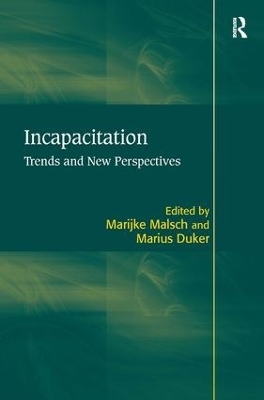
Incapacitation
Routledge (Verlag)
978-1-4094-3995-0 (ISBN)
In many criminal justice systems a new trend towards incapacitation can be witnessed. A ubiquitous want for control seems to have emerged as a consequence of perceived safety risks. This can be seen not only in the mass incarceration of offenders but also in the disqualification of offenders from jobs, in chemical castration in cases of sexual crimes, the increased use of electronic monitoring and in the life-long monitoring of individuals who pose certain risks. Trends towards incapacitation are now even spreading to public administration and the employment sector, in the refusal of licenses and the rejection of employees with past criminal records. This book discusses the topic of incapacitation from various angles and perspectives. It explores how theories of punishment are affected by the more recent emphasis on incapacitation and how criminal justice practice is changing as a consequence of this new emphasis. Many contributors express criticisms with this trend towards incapacitation. They argue for a better calibration of measures to the severity of the misconduct. In addressing an increasingly important development in criminal justice, the book will be an essential resource for students, researchers, and policy-makers working in the areas of criminal law, sentencing, probation and crime prevention.
Marijke Malsch (PhD) is a senior researcher at the Netherlands Institute for the Study of Crime and Law Enforcement (NSCR) in Amsterdam, the Netherlands. Her current research focuses on legitimacy of the judicial system, experts in the criminal justice system, stalking legislation in Europe, and lay participation in the criminal justice systems of European countries. Malsch is also working as a honorary judge at the Appeals Court of Den Bosch and the District Court of Haarlem. Marius Duker (PhD) is an associate professor at the Department of Criminal Law and Criminology of VU University in Amsterdam, the Netherlands. His PhD thesis is concerned with the measures adopted in the Netherlands to improve consistent sentencing in criminal law. He worked for six years in Dutch criminal law practice and now his current research focuses on subjects that centre around the criminal law perceived as a means of last resort. Duker is also working as a honorary judge at the District Court of Amsterdam.
Chapter 1 Introduction, Marijke Malsch, Marius Duker; Chapter 2 Total Incapacitation: The Penal Imaginary and the Rise of an Extreme Penal Rationale in California in the 1970s, Jonathan Simon; Chapter 3 The Incapacitation of the Dangerous Offender: Criminal Policy and Legislation in the Federal Republic of Germany, Hans-Jörg Albrecht; Chapter 4 The Risk of the Persistent Offender and the Special Security Measure, Martin Moerings; Chapter 5 Post-Sentence Incapacitation of Sex-Offenders and the Ethics of Risk Assessment, Bernadette McSherry; Chapter 6 Incapacitation by Pre-Trial Detention, Lonneke Stevens; Chapter 7 Part-Time Incapacitation: Probation Supervision and Electronic Monitoring, Peter H. van der Laan; Chapter 8 Incapacitation: Anti-libidinal Medication in the Treatment of Sex-Offenders, Jelle A. Troelstra, Monique Kossen, Jan R. Niemantsverdriet, Karel Oei; Chapter 9 Circles of Support and Accountability: Combining Prevention and Incapacitation within a Communitarian Approach for Released Sex-Offenders, Bas Vogelvang, Mechtild Höing; Chapter 10 Disqualification from a Profession or an Office: Nature and Actual Practice, Marijke Malsch, Wendy Alberts, Jan de Keijser, Hans Nijboer; Chapter 11 The Application of Administrative Law against Organized Crime: Refusing and Revoking Licenses as Incapacitation, Wim Huisman; Chapter 12 Criminal Records as an Instrument of Incapacitation, Miranda Boone; Chapter 13 Estimating the Effects of Imprisonment: Intended and Unintended Consequences of Incarceration, Arjan A.J. Blokland, Daniel S. Nagin; Chapter 14 Incapacitation: Trends and New Perspectives, Marius Duker, Marijke Malsch;
| Verlagsort | London |
|---|---|
| Sprache | englisch |
| Maße | 156 x 234 mm |
| Gewicht | 635 g |
| Themenwelt | Recht / Steuern ► Allgemeines / Lexika |
| Recht / Steuern ► Arbeits- / Sozialrecht ► Sozialrecht | |
| Recht / Steuern ► EU / Internationales Recht | |
| Recht / Steuern ► Strafrecht ► Kriminologie | |
| Sozialwissenschaften | |
| ISBN-10 | 1-4094-3995-X / 140943995X |
| ISBN-13 | 978-1-4094-3995-0 / 9781409439950 |
| Zustand | Neuware |
| Haben Sie eine Frage zum Produkt? |
aus dem Bereich


